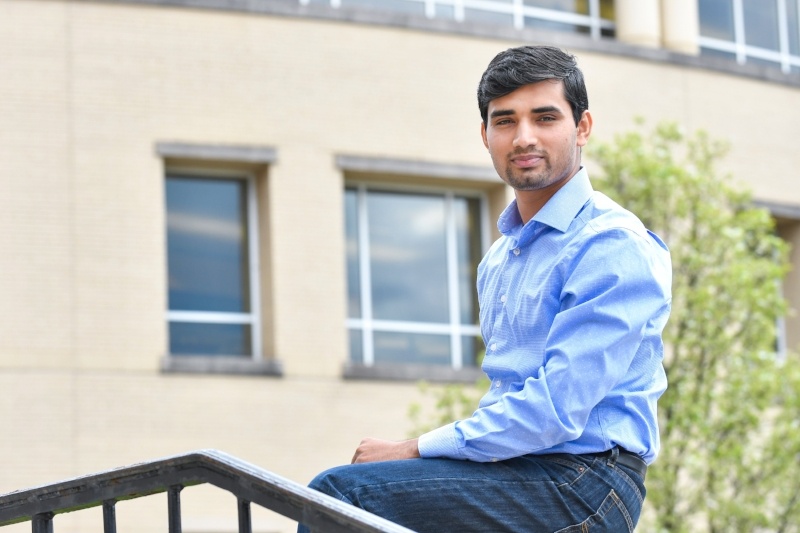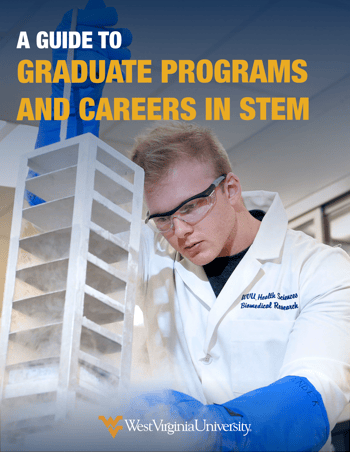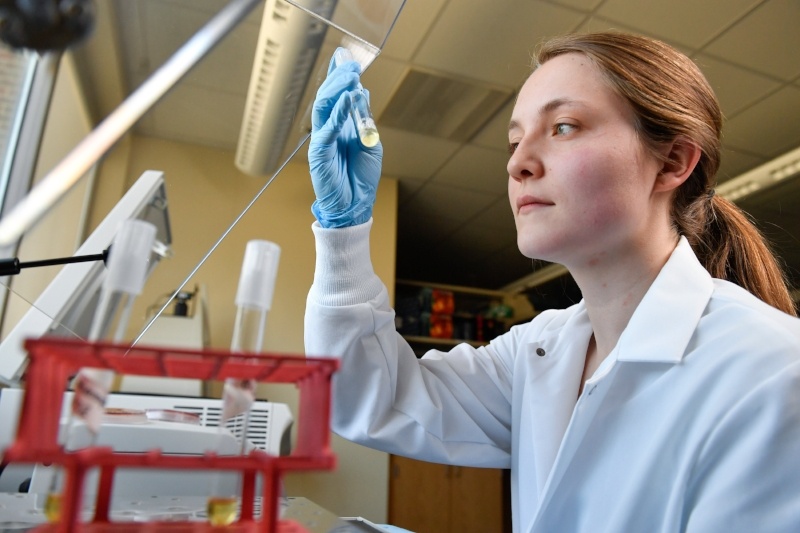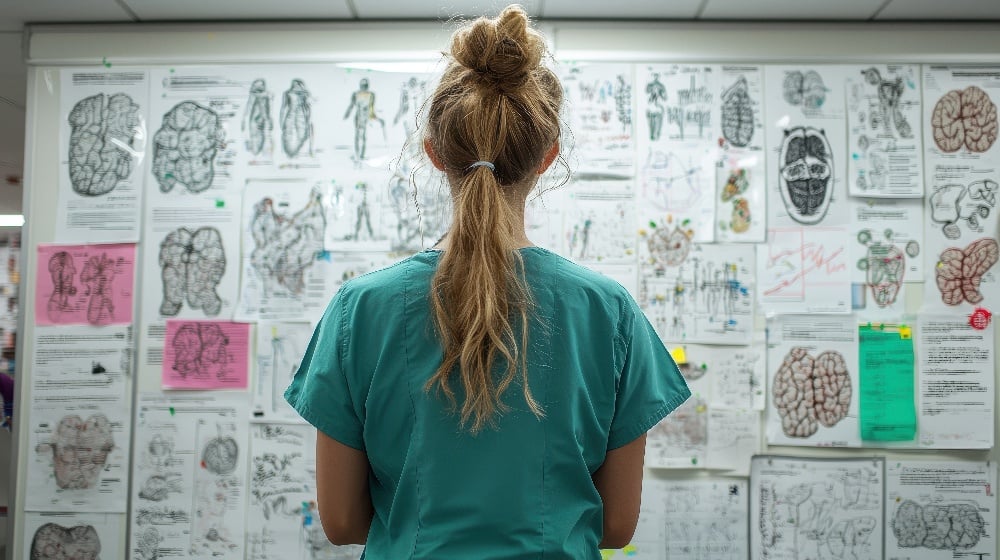
"STEM education generates critical thinkers and promotes innovations that lead to novel ideas, products, and new technology — which is very important for the sustainable economic growth of this country."
That's what Sobhit Singh, a PhD graduate of West Virginia University's Physics program, had to say about what drove him to pursue a doctorate degree in this particularly complex field.
We dug a little deeper and asked Sobhit about his experience at WVU, how he plans on promoting innovation in his field, and how he'll use his advanced degree to challenge the status quo.
Tell me a little bit about yourself. What’s your name, age, and where are you from?
My name is Sobhit K. Singh. I am 26 years old. I started my PhD degree when I was 21. I am from India. My home town – Shravasti – is particularly famous for its associations with the life of Lord Buddha. Lord Buddha spent most of his monastic life in Shravasti.
Where did you study before attending WVU?
I attended Lucknow Christian Degree College (Lucknow, India) to pursue a Bachelor of Science (B.Sc.) degree. After finishing my B.Sc. in 2008, I joined Indian Institute of Technology Guwahati (IIT-G) for a master’s degree (M.Sc.) in Physics. During my M.Sc., I was introduced to the materials research field by Prof. Subhash Thota.
I started my research career as an experimental condensed matter physicist, but now I am doing theoretical quantum mechanical calculations to discover new materials and predict their properties. Knowledge gained during my master’s degree has greatly helped me to comprehend the fundamental properties of materials and is incredibly assisting me in discovering and designing novel materials.
Tell me about the Physics program you just completed at WVU. What, in particular, did you study/research?
I completed the PhD program in the Physics and Astronomy department of WVU. I had been very fortunate to be a part of the computational materials research group led by Prof. Aldo Romero.
My research involved discovery of new material and their characterization using first-principles calculations. In particular, I studied materials that have strong spin-orbit coupling, i.e. coupling between the electron’s spin and orbital motion around the nucleus. By utilizing this feature, whose effects are not yet fully understood in many materials, we can efficiently harness the spin degree of freedom of electrons and develop the long-sought spin-electronics (spintronics) technology.
This technology will enormously increase the power of computers and other electronic devices compared to the present generation of electronic systems.
Why do you think pursuing an advanced degree in a STEM field is important for people who want to promote innovation in your field?
Well, as the saying goes that “Once a new technology rolls, you are either part of the steamroller, or part of the road”. There is no middle ground.
In the past century, STEM and STEM education has been consistently pervading and influencing our lifestyles. It is continuously expanding into every aspect of our lives. An advanced degree in STEM opens a plethora of job and career opportunities for students. STEM education generates critical thinkers and promotes innovations that lead to novel ideas, products, and new technology - which is very important for the sustainable economic growth of this country.
I believe that USA became a world leader because of the fact that people here realized the importance of STEM education long ago, and they paid appropriate deserving attention to STEM field.
Can you tell me a little bit about your dissertation?
Of course. My PhD dissertation focused on the materials in which electron’s spin and orbital degrees of freedom are strongly coupled, which means by playing with one degree of freedom we can control the another one. I paid special attention to bismuth (Bi) and antimony (Sb) based compounds. These two elements inherit very strong spin-orbit coupling compared to the other elements in the periodic table. Although, we have been using Bi-Sb alloys since past some decades in designing thermoelectric coolers for practical purposes, - these alloys are among one of the best thermoelectrics yet known – their many other important features were unknown.
So in my research, I explored the complete phase-diagram of Bi-Sb alloys and discovered several new crystal structures of these alloys that could host remarkable properties. These new structures are promising candidates for applications in spintronics, thermoelectrics, and quantum computing industry. In addition to the structure prediction, my research revealed existence of an emergent quantum phenomenon in a very special family of materials which arises due to the coexistence of two distinct type of novel quasi-particles.
One notable result from my research is the theoretical prediction that one can efficiently create and harness the dynamics of Weyl fermions in solid crystals. Weyl fermions, quantum particles that were recently detected in lab after a long persistent search of 88 years, promise to conduct electricity at ultra-high speed without any energy loss or resistance. One year after my prediction, a team of scientists from Princeton and California State University experimentally verified my theoretical claims.
Did you participate in a graduate assistantship?
Yes. I served in a graduate assistantship as a TA in the physics department for almost two years.
As a TA, I taught undergraduate physics laboratory courses, proctored exams, and graded answer sheets of students. I truly enjoyed the teaching part of this job. I also designed some new experiments for undergrads and helped professors in reforming the existing labs.
Tell me about one faculty member who really made a difference in your education at WVU as a PhD student.
Prof. Mohindar S. Seehra. He has really made a big difference in my academic life and helped me to become what I am today. He has been an outstanding mentor, collaborator, and a great source of inspiration to me.
In the early years of my PhD degree, I worked in his laboratory and performed experiments. It was he who realized that I am good at theoretical physics. He often told me that I was “gifted in theoretical physics” (in his own words) and encouraged me to get some training and experience in theoretical research for the good of my long term research career. Following his advice and my own passion to acquire a more profound understanding of materials research, I joined the research group of Prof. Romero and completed my PhD in theoretical research. However, I continued collaborating with Prof. Seehra and kept publishing with him.
Tell me about your new position in New Jersey. How did WVU prepare you for success in that position?
After my PhD, I joined the theoretical condensed matter physics group at Rutgers as a Postdoctoral Research Associate. Here, I am working with Prof. David Vanderbilt and Prof. Karin Rabe to understand and unveil mysteries of the novel materials.
It is indeed a big step in my academic life, and I must say that WVU fully prepared me for it. The course work, research experience, training opportunities, and most importantly scholarships and fellowships at WVU greatly helped me to achieve this success.
My PhD advisor, Prof. Aldo H. Romero, always encouraged me and supported me to attend conferences and interact with the rest of the science community and learn from the experience. He gave me the freedom I needed to think innovatively and produce ideas. The scholarships and honors at WVU always inspired me to work harder and stay determined to achieve my long term goals in academia.
I hope one day I will be able to help other Mountaineers by giving back to the WVU community.
What’s your favorite thing about WVU?
I loved so much about WVU — the Mountaineer spirit, awesome people, and the elegant campus. I made really nice friends and memories to cherish forever at WVU. I always felt at home on WVU's campus, and the Physics department was like a big family to me!
West Virginia University is here to help you succeed.
Wherever you see yourself, WVU is here to help you become exceptional. If you're interested in joining our community, we hope you'll request more information today!
Also, if you have questions about the below topics, we have resources to help you there too!
- Securing a graduate assistantship
- Choosing a graduate school
- Financing graduate school
- GRE test prep
- Making a career change
- Enrolling in graduate school online
- Choosing a STEM education
As a future leader in STEM education, we invite you to explore our interactive resource — A Guide to Graduate Programs and Careers in STEM!




-489630-edited.jpg)






